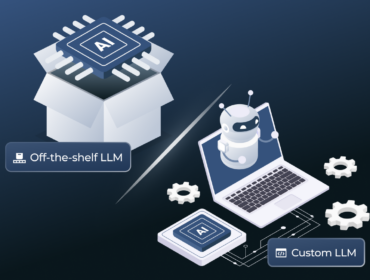Сould your business benefit by implementing blockchain technology? To answer that, it is important to understand which blockchain platform is best suited to your business’s needs. This article will delve into the nuances of different blockchain platforms to help you make the right choice.
What is a Blockchain Platform?
A blockchain platform serves as a foundation for the development and hosting of decentralized applications using an existing blockchain infrastructure. These platforms can be permissioned or permissionless. Hyperledger, Ripple, Ethereum, EOS, and R3 are all examples of blockchain platforms.
What benefits does blockchain bring to business?
- No risks with unreliable parties. Blockchain algorithms are built in such a way that each block is related to the previous one. When a new one is added (which is confirmed by each participant), the registry is automatically updated. Thus, you do not have to worry about a party not fulfilling their obligations.
- Accelerated transactions. Money transfers sent via blockchain take no more than 2-3 minutes. Using “traditional” methods, the procedure can take up to several days.
- Reduced commission costs. Blockchain technology significantly reduces costs due to the lack of intermediaries. If a company issues many transactions, even seemingly small commissions can add up to a tidy sum.
- Confidentiality ensured. Hacking the blockchain requires access to the millions of computers that are involved in the network. This is technically impossible to achieve. By using blockchain technology, companies get one hundred percent security for free.
Blockchain technology saves companies money, automates most processes, and reduces risks.
Before we discuss the pros and cons of some of the most popular blockchains, let’s figure out which factors are most critical when deciding on the best blockchain platform for your business.
How to Choose a Blockchain for your Business?
Despite the wide use of blockchain platforms among different businesses and industries, you’ll need to do a little homework before settling on one that will fit your specific requirements. When choosing blockchain, be sure to consider the following factors:
-
- Is it popular? Check the reputation of a blockchain on portals like GitHub or Reddit. Read reviews to find more information about its pros and cons. Check how many nodes/wallets are on a blockchain explorer for a specific blockchain. View completed projects on the foundation’s website. Check out the developer community on Discord.
- What type of blockchain do you need? Before you choose a type of blockchain for your specific use case, you should define all of them. Check which network the platform supports, i.e., public, permissioned, or private. Private blockchains operate in a closed network, while public ones are open to anyone with an internet connection. With a permissioned blockchain, users need permission to use the network or participate in the consensus process.
- What is the Programming Languages of the Platform? As blockchain continues to develop, more and more programming languages are introduced. Before choosing a blockchain, check what languages are supported by the SDKs of the platform. C++, Python, Java, Solidity, Golang, Vyper, C#JavaScript, Simplicity, and Rholang are among the most popular programming languages for blockchain.
- What Consensus Protocol does the Platform Use? There are different types of consensus algorithms, for example, Proof of Work, Proof of Burn, Proof of Stake, etc. It is important to learn about the blockchain consensus protocol to eliminate any associated difficulties that come with working on the platform.
- Does the Platform Support Smart Contracts? Smart contracts are responsible for validating and enforcing actions on the blockchain systems. However, not all platforms support smart contract functionality.
- Is the platform scalable enough? As your business grows, so do your business needs and expectations from customers. And when the number of transactions and network participants increases, your blockchain platform has to be able to scale and adapt to the growth of your company.
Below is a comparison of several popular platforms for building blockchain-based apps.
| Ethereum | XDC Network | Avalanche | Terra | Stellar | Hyperledger Sawtooth | |
| Industry | Cross-industry | Cross-Industry | Cross-Industry | Cross-Industry | Financial Services | Cross-Industry |
| Ledger Type | Permissionless | Permissionless | Permissioned | Permissioned | Public & Private | Permissioned |
| Consensus Protocol | Proof of Work | XDC Delegated Proof-of-Stake | Proof of stake | Tendermint Delegated Proof of Stake | Stellar Consensus Protocol | Pluggable Framework |
| Smart Contracts | Yes | Yes | No | Yes | Yes | Yes |
Ethereum
Ethereum is an open-source software platform based on blockchain technology. This platform allows developers to create and deploy decentralized applications (dApps) such as Status or Metamask.
Since Ethereum is a decentralized platform for dApps, it comes packed with all the innovative benefits of blockchain technology:
- Immutability
- Noncensorship
- Security
- Transparency
XDC Network
XinFin Network (XDC) is a proprietary open-source hybrid blockchain cryptocurrency specializing in tokenization for real decentralized finance. Developers position XinFin as a decentralized, hybrid, interoperable, and liquid network.
Key features of XinFin:
- XinFin XDPoS Hybrid Network Using XDC Protocol
- ISO 20022 compliant messaging for private and hybrid state
- Fast and energy-efficient XDPoS consensus
Avalanche
Avalanche is a platform for launching Decentralized Finance (DeFi) applications, financial assets, trading, and other services.
The platform aims to become something of a global digital asset exchange network, allowing anyone to create and trade in any form. Every trade is controlled in a decentralized way using smart contracts and other cutting-edge technologies.
The platform’s developers claim that Avalanche’s standard for finalizing a transaction is less than one second.
Terra
Terra is a blockchain protocol that uses stablecoins pegged to fiat currency values to provide a stable price for global payment systems. Terra combines price stability and widespread fiat currencies with the censorship resistance of Bitcoin (BTC) along with fast and affordable settlement. Terra’s own token, LUNA, is used to stabilize the protocol’s stablecoin price. LUNA owners can also submit and vote on governance proposals.
Stellar
The Stellar Network is a decentralized peer-to-peer structure and Lumens (XLM) is the token that supports it.
The idea behind Stellar is that anyone using its services can transfer anything from traditional currencies to tokens that represent both new and existing assets (dollars, euros, bitcoins, stocks, gold, and other valuable tokens). These assets can then be exchanged between users for minimal fees using Lumens.
Hyperledger Sawtooth
Hyperledger Sawtooth is a modular platform for building, deploying, and running private blockchain networks based on the Proof-Of-Elapsed-Time consensus algorithm.
The main advantage that Sawtooth provides developers is a separation of the core system and the application layer, which allows developers to create the necessary rules of behavior for applications in any language.
The main functionality of Hyperledger Sawtooth includes:
- Creation of private networks
- Compatibility with Ethereum smart contracts
- Parallel execution of transactions
In Conclusion
As a technology consulting company, Unicsoft provides blockchain consultation to clients, helping them select the right blockchain platform and technology stack that satisfies their specific business needs.





![Which Blockchain to Use in 2023? The Ultimate Guide What’s the EU Artificial Intelligence Act and How to Comply? [Webinar]](https://unicsoft.com/wp-content/uploads/2024/03/Cover_1140_v1.1-370x280.png)

